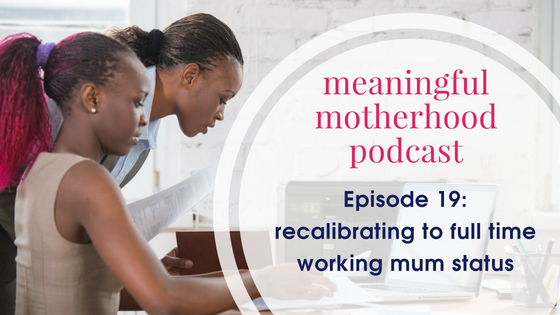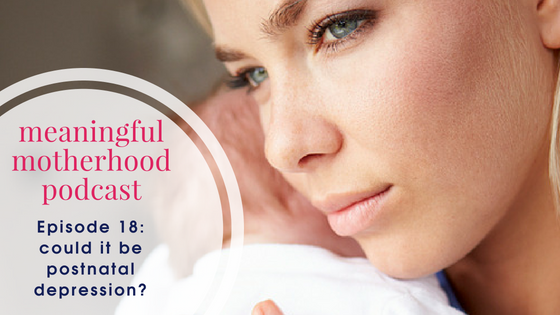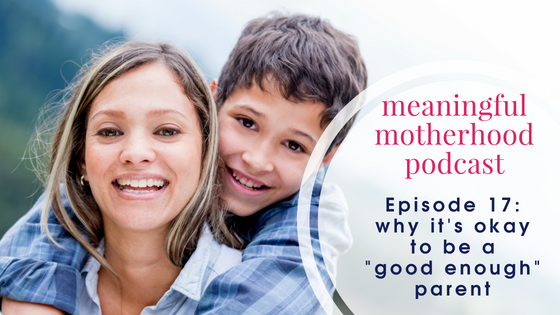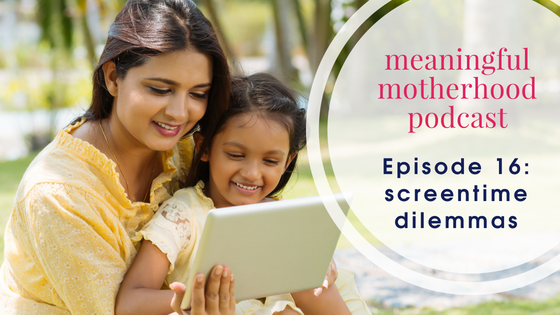
by Sarah | Jun 13, 2018 | Meaningful Motherhood Podcast
I never wanted to be a “Full Time Working Mum”.
Honestly, I didn’t. Being a woman running her own part time* clinical practice, while also doing my best to raise two young girls was enough for me. (*and by part time I mean three days of client work plus a buttload of admin, which is pretty much almost, kinda full time anyway.)
But then an opportunity cropped up. One that was too good to refuse. One that might lead me somewhere I’m very keen to visit one day. So I had to take that opportunity when it reared its head.
Which means I’m now a card carrying member of the “full time working mother” brigade – FTWM, if you please. It’s meant quite a few changes. On the home front and in my private practice, not to mention personally for me. I’m still figuring it all it, I’m melding it to suit me personally – and my version of FTWM probably looks a helluva lot different to many others’ versions of it.
It has also meant, unfortunately, that I’ve been a bit lax on the ole’ podcasting schedule. Oops. My bad. I thank you for being patient with me in this transition period.
I explain what it’s all about in this episode.
Have a listen and, as always, let me know your thoughts. How do you manage the FTWM thing? Do you thrive? Did you try it and find it just wasn’t for you? What is your happy working day number? What are your favourite hacks?? (Please tell me – I need all the help I can get!!)
Until next time,
Sarah xx

by Sarah | Apr 20, 2018 | Meaningful Motherhood Podcast
Welcoming a new baby into the world is an experience like no other.
Being a new parent brings a whole gamut of emotions, responsibilities and questions. Many of which we’re completely unprepared for. But what happens when those emotions, responsibilities and questions become too much? When “unprepared” becomes “unable to cope”?
When does new parent overwhelm become postnatal depression?
Current statistics tell us that postnatal depression (PND) now affects one in 7 new mothers and one in 20 new fathers. But despite the increased incidence of PND in our society, there still seems to be misunderstanding about what PND actually is and how it is treated.
This episode of the Meaningful Motherhood podcast covers the difference between the “baby blues”, a general sensation of parental overwhelm, and a clinical diagnosis of postnatal depression.
Until next time, Sarah xx
ps – keep reading for important info if you have concerns about your own mental health, or that of others.
Could you have Postnatal Depression?
For the past two weeks or more have you felt the following on a regular or frequent (daily) basis?
- Difficulty being able to laugh and see the funny side of things
- Decreased ability to look forward to enjoyable activities.
- Blaming yourself unnecessarily when things have gone wrong
- Feeling anxious or worried for without good reason
- Feeling like things are frequently “getting on top of you”
- Difficulty sleeping or sleeping excessively
- Frequently feeling sad or miserable quite often
- Frequent bouts of crying
- Having thoughts of harming myself of others **
If you, or someone you know has been exhibiting several of these symptoms frequently over a two week period or more, please advice from your doctor, midwife or community health agency. ** If you answered yes to the final point, please seek immediate support.
For anyone concerned that they, or someone they know, might be experiencing PND, the best course of action is to seek support from a health professional. Speaking to your maternal health nurse, midwife, obstetrician, or GP is generally the first step. But you can also feel confident seeking out a counsellor, mental health OT, or psychologist, which in many cases doesn’t require a referral.
For further resources about PND, please visit the following websites:
https://www.panda.org.au/

 https://www.beyondblue.org.au/
https://www.beyondblue.org.au/

 http://gidgetfoundation.com.au/
http://gidgetfoundation.com.au/

If you require immediate support, please contact Lifeline on 131 114

by Sarah | Apr 4, 2018 | Meaningful Motherhood Podcast
Is it better to be a “perfect parent”, or a “good enough parent”?
What does being a “good enough parent” even mean?
When we lie to our children about the mistakes we make – who are we really protecting? Them? Or us?
And how does this all link to the latest cricketing scandal?
Check out this podcast episode for the answers.

by Sarah | Mar 22, 2018 | Meaningful Motherhood Podcast
iPad, TV, laptop, PC, games console, smartphone…..
How much screen time does your child get? Do you think that’s too much? Have you observed behaviour problems in your children directly related to screen usage?
The topic of screen time is always a hotly debated one, and its been a big topic of conversation on the Bloom Wellbeing Facebook page recently, so I thought this week I’d talk at length about my thoughts on screen time, what screen time rules we have in place in our household (and why) and how you as a parent can make positive changes to screen usage in your home, in a way that suits your family.
by Sarah | Mar 15, 2018 | Meaningful Motherhood Podcast
“How can I help my child manage their big emotions, when I can’t even manage my own emotions?”
This episode of the Meaningful Motherhood podcast is all about the topic of self-regulation and how this leads to co-regulation – or a parent’s ability to help support their baby or child manage their emotions, feelings and behaviours. We also talk about the impact on a child when a parent struggles with their own self-regulation, and what we can do to seek support in these instances.





Recent Comments